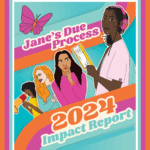By Sahana Sudarsan, Let’s Write About Sex Education Fellow at Jane’s Due Process & Austin Bat Cave
Sex education has become a phrase that gets passed around every May, followed by whispers, giggles, and sighs. I remember being stuffed in a classroom with 100 other fourth grade girls and watching a video about periods, giggling every time the smiley teacher on-screen said the word “vagina.” We left dazed, confused, and embarrassed, holding flowery gift bags with a pad, a mini deodorant stick, and a smiley face sticker. Nobody had any idea what the boys did in the other room, and no one was to ever speak of that day.
Starting from the third or fourth grade, we begin to be taught about what is “down there.” The sex education curriculum found in most elementary schools consists of a 50-minute video from the eighties and an awkward question and answer where the teacher avoided giving direct responses. Miraculously, I didn’t even know the word “sex” until the end of sixth grade. While my sex ed experience was pretty sheltered, I have to give my middle school some credit. They tried teaching us about consent and relationships, but our class couldn’t stand the awkwardness, to the point where we had to stop the program. Even now that I’m in high school, my entire grade can’t believe it when we read a book that mentions sex. The embarrassment and confusion that surrounds sex stems from a young age, whether it’s from our elementary school education, what we hear from our parents, or what we see online. This unclarity has to be eliminated through a team effort by both the school, to introduce a comprehensive curriculum in grades 3-6, and parents, to answer kids’ questions honestly and openly.
Most Texas schools teach an abstinence-only curriculum, meaning that students learn that having sex will yield negative consequences and is not the morally right thing to do. Some schools teach an abstinence-plus curriculum, which not only strongly encourages abstinence but includes minimal information about contraceptives and STI’s. Neither of these curriculums teaches what sex is beyond biological anatomy, and instead teach the consequences. Although Texas pushes an abstinence focused curriculum, the teen pregnancy rates are over 50% higher than in the rest of the United States. Texas doesn’t have a specific health curriculum that they mandate all schools to teach, but instead, this decision is left up to the schools. The stigma surrounding sex, and all things related to sex can be traced to the school’s lack of motivation to improve the curriculum, leaving kids in the dark about the realities of sex.
Kids are over 50% less likely to experiences STI’s and teenage pregnancies if they’ve had comprehensive sex education. Like I mentioned, sex ed has to be a partnership between schools and parents. And yet many schools don’t teach sex ed because they believe that it is the parents’ responsibility to handle it in however they think is best for their kids, but most parents don’t talk about consent, sexual health, and other important topics. Yes, talking about sex can be an awkward topic, but it doesn’t have to be. Sex is a natural thing, and as parents typically want the best for their children, they shouldn’t shy away from the topic. Parents should be a safe space where kids can ask questions.
Many parents don’t talk to their kids about sex because they’re concerned about maintaining their child’s innocence. Not only is this misguided (does childhood innocence even exist anymore?), but information that isn’t learned at home or in school can leave TV and the internet to fill in those gaps: the portrayal of sex online is often distorted and confusing, leaving kids with unrealistic information about what sex and relationships are. The worst part about being internet-educated, in my experience, is that teens won’t know whether their peers think or know the same things about sex, causing sex to become a taboo subject and one that is never discussed. If teens can’t discuss sex, we will never be able to develop important opinions and boundaries and that helps us decide what we feel comfortable talking about and doing.
While our school curriculum was less than great, the next wave of youth might have a chance, My school district, Austin ISD, has recently taken steps to change the sex education curriculum for 3-8 grade to include topics like dating and sexual violence, consent, LGBT relationships, and more. While I commend AISD for finally updating their curriculum, fourth graders all over Texas are still giggling at grainy puberty videos in a tiny classroom. If this kind of abstinence-only, discussion-discouraged curriculum continues, kids all over Texas will be in danger.
If you have concerns about your sexual and reproductive health, our volunteer advocates are available 24/7 at 866-999-5263 and by text 8am-11pm CT to support you. Please don’t hesitate to contact us if you need help accessing birth control, STI testing & treatment, or abortion in Texas.




